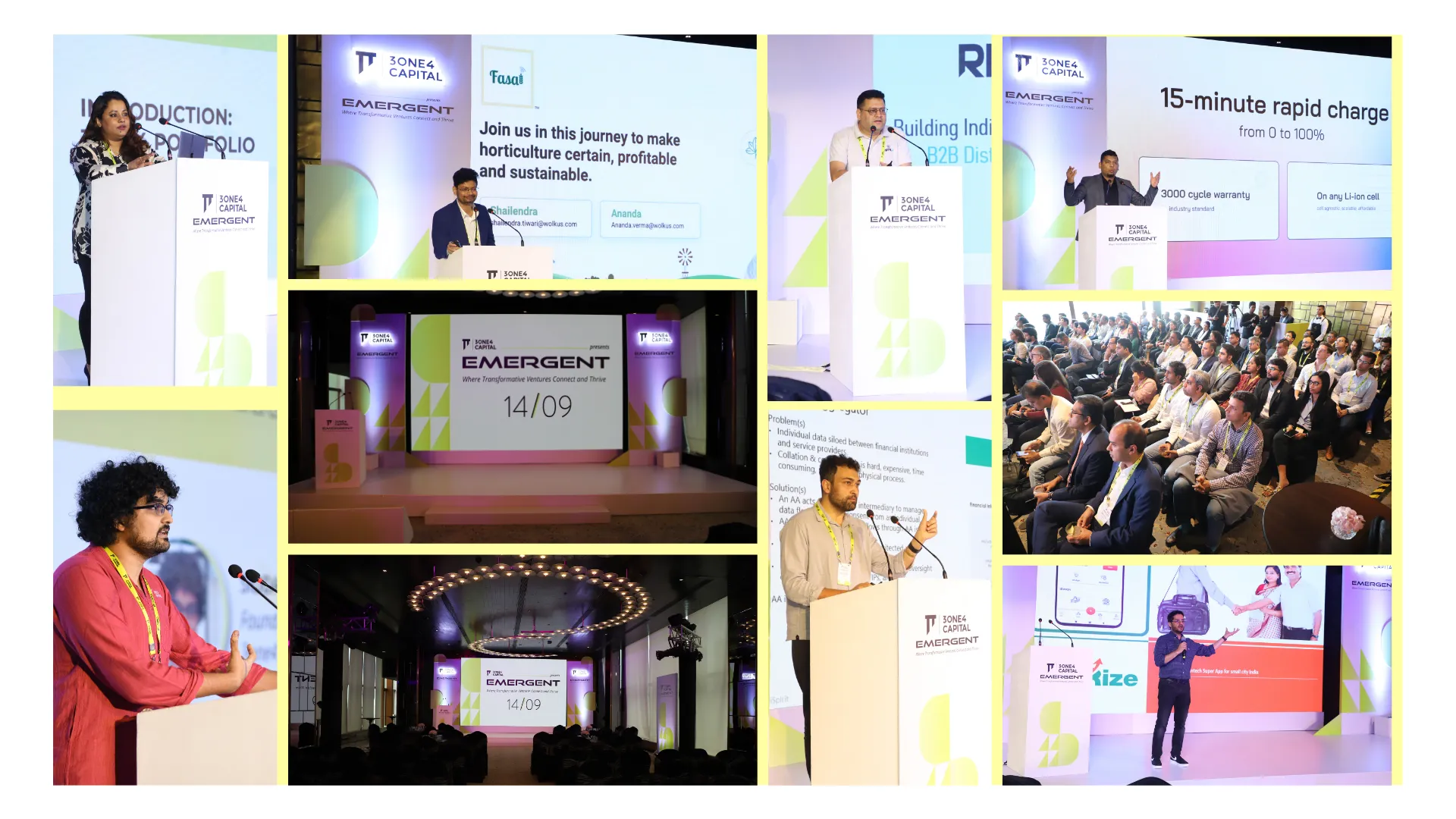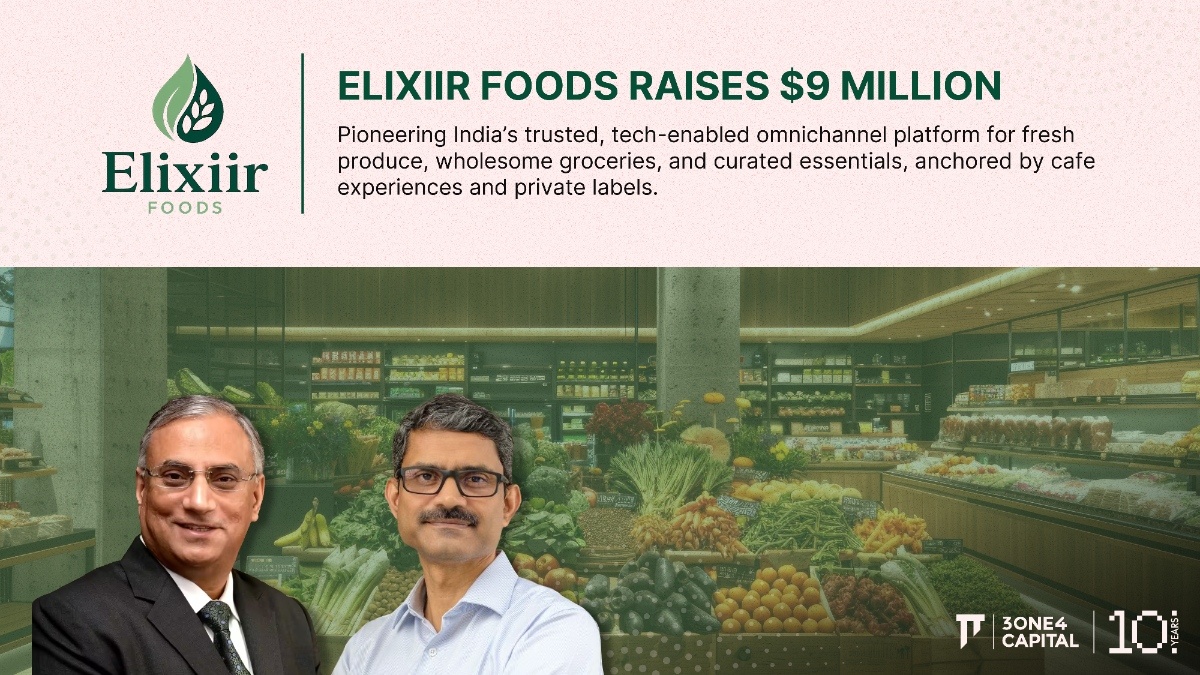
3one4 Capital's Emergent 2023: Building For India's Digital Transformation and Economic Levelling Up
In the ever-evolving landscape of the Indian startup ecosystem, where innovation and transformation are dismantling long-standing paradigms, startups are heralding a new era characterised by problem-solving, growth, confidence, and intentional social impact. These generational businesses aren't just striving for success; they're on a mission to revolutionise the economy via positive-sum business models.
At 3one4 Capital, our mission is to uncover hidden opportunities from the earliest stages of company formation. We firmly believe that India is in the midst of a population-scale evolution, and we are dedicated to providing a robust foundation for innovative teams solving for this unique market.
Against this dynamic backdrop, 3one4 Capital hosted Emergent 2023 in Mumbai, our inaugural portfolio engagement program, uniting top-tier institutions and tech companies to explore growth opportunities across diverse sectors. The program facilitated connections between growth-stage firms from our portfolio and industry leaders from corporations, institutions, and tech companies, fostering mutual learning, knowledge sharing, and relationship-building.
We're grateful for our strong investor base, whose support and participation have played a pivotal role in the success of our Emergent Program. Day 1 of Emergent saw 50 meetings conducted with a diverse range of investors and founding teams. Twenty of our portfolio companies from enterprise tech, fintech, climate tech, and deep tech had the opportunity to connect with these investors to explore potential business synergies.
On Day 2, we brought together the ecosystem and had the pleasure of hosting 150+ guests from Mumbai’s leading institutions for an engaging portfolio forum. Pranav Pai delivered an insightful keynote, emphasising the transformative influence of startups and technology on various sectors of the Indian economy and our experiences working with the founders we have backed. Following this, our portfolio companies shared compelling presentations highlighting their progress and future plans for growth and expansion. Siddarth Pai concluded the event with his closing remarks to reaffirm 3one4 Capital’s commitment to supporting the growth of India's next generation of market leaders.
In summary, here's an overview of Day 2 of the Emergent program:
India - Startup Nation
Keynote Address by Pranav Pai
The backdrop to today's market dynamics emerges from an acceleration of technology penetration after the COVID-19 pandemic. This global event acted as a catalyst, revealing intriguing patterns of resilience in technology-driven sectors across various economies. Notably, central banks responded with a staggering $18 trillion in stimulus support, marking an unprecedented milestone in modern economic history.
Technology is changing our lives permanently, and this adage is now a truism. Tech has transformed markets into real-time voting mechanisms, often projecting a future that extends far beyond our present reality. Zoom's meteoric rise and subsequent correction, alongside the resurgence of airline stocks, exemplify this phenomenon. Meanwhile, the private markets unveiled a new and more rapid feedback loop, shedding light on how companies and technologies would evolve, grow, and command value in the post-pandemic world.
In 1917, the top 10 companies by market cap in the US were predominantly centred around industries such as steel, armory, and oil. Fast forward to 2022, 8 of the top 10 companies in the US are now tech companies, a shift that shows the true strength of the tech duopolies that surround us. Tech companies are not only massive in market cap but are also rapidly becoming more profitable. They're not just successful as a single product company; they're transforming whole industries and growing into expansionist conglomerates. Startups now face the challenge of competing not only with industry incumbents but also with these tech giants.
At 3one4 Capital, we grapple with an attention economy thesis, recognising the pivotal role these companies play in shaping the digital landscape. In today's digital age, companies are transcending traditional boundaries, extending their reach beyond products, profits, and even national legislation. These expansionist monopolies, led by tech giants, wield unparalleled influence, navigating seamlessly through borders powered by data and AI. Competing with them demands innovation and agility, especially in emerging markets like India, where these conglomerates play by new rules over shorter innovation cycles.
India, a radically different market, has witnessed a remarkable economic ascent, poised to surpass the $5 trillion GDP mark over the next five years, thereby establishing a unique position in the global economic landscape. As the nation grows wealthier and basic necessities are progressively met, digitisation assumes a distinctive character driven by a growing digital population. India boasts one of the largest digital populations globally with over 1.4 billion people, 800 million internet users, and 650 million smartphone owners.
India's digital journey has been notably distinctive. Unlike many other nations, it is characterised by widespread cellular connectivity and smartphone usage, democratising internet access. Compared to China, India is swiftly narrowing the gap across various online domains, including social media, gaming, and digital payments, presenting a vast market for businesses to tap into.
In this digital landscape, user engagement and online spending have become habitual, driving substantial growth in e-commerce. The narrative has shifted from initial scepticism to a deep-rooted trust in online transactions, paving the way for an exciting $180 billion retail opportunity. The Indian e-commerce narrative is far from a slowdown; it's an ever-evolving saga, continually integrating more population segments, even beyond urban centres.
India is not a monolith; it's a multi-layered market. While the urban population drives substantial consumption, the narrative is extending to rural and semi-urban areas. A uniform trend is emerging — increasing comfort and reliance on the internet to enhance lives. This diverse landscape presents a nuanced play for companies and startups aiming to capture the breadth and depth of this burgeoning market.
The Indian business landscape is radically transforming, propelled by technological advancements and policy initiatives. The introduction of the Goods and Services Tax (GST) and the India Stack initiatives have formalised and streamlined business operations. This transformation extends to B2B enterprise applications, with companies experiencing profitability sooner than anticipated after their initial funding rounds. The era of thin margins at the top is giving way to a more robust and sustainable full-stack business model.
India's startup ecosystem has rapidly grown to become the world's third-largest, boasting an impressive tally of 99,000 registered startups. The Government's initiatives to foster young enterprises have yielded exceptional results, creating $450 billion in value, including IPOs and private market valuations. However, as with any tech sector, there's a noticeable concentration of companies, with 67% of all startups concentrated in Bangalore, Mumbai, and the NCR region. Yet, India continues to attract significant global capital, with $25 billion raised across 1,400 deals in 2022, even during challenging global economic conditions.
It's essential to acknowledge that India's startup success story is built on the foundation of the country's IT services industry, which ranks among the largest globally. With annual revenues of $240 billion, impressive export figures, and employment for 5.5 million people, India's IT prowess has facilitated the growth of startups. These young companies are not just recruiting from the IT giants but also benefiting from their training and expertise. This symbiotic relationship has accelerated software development in India, offering global competitiveness in terms of both pricing and quality.
The convergence of several factors, including the Digital India initiatives, Jio's disruptive impact, Aadhaar, UPI, and the India Stack, has resulted in an internet-savvy population. India currently has 800 million internet users, 1.2 billion active mobile connections, and 650 million smartphone users. This digital inclusion has made essential services accessible to every Indian, from education and healthcare to job searches and remittances.
The India Stack, which includes Aadhaar and UPI, has revolutionised innovation in the country. What would have taken years elsewhere can now be accomplished in a matter of weeks, thanks to the ease of access to APIs and permissions. The recent launch of the Account Aggregator (AA) framework is set to transform financial services further, fostering collaboration between financial institutions and younger companies. This collaboration promises a dynamic and efficient future for India's fintech sector.
A game-changing development on the horizon is the ONDC (Open Network for Digital Commerce), which is set to transform the retail supply chain in India. ONDC will create a versatile platform for various applications, allowing users to engage in a wide range of commerce activities. This disintegration of vertical supply chains and commerce models is a grand theory, but it's gaining traction in practice. ONDC is expanding its reach beyond commerce, extending to financial services and mobility as well. The mainstreaming of Indian DPI (Digital Public Infrastructure) is accelerating this transformation, with hundreds of millions of users adopting these platforms, driving faster decision-making and a willingness to pay for valuable services.
One of the remarkable features of the Indian tech landscape is the absence of a single DPI monopoly. This inclusivity and competition are shaping a unique and vibrant ecosystem that promotes innovation and growth.
Indian startups are rewriting market dynamics year after year, debunking myths along the way. Kuku FM, for instance, has shattered the belief that Indians won't pay for digital products or services. With 3 million paying subscribers, Kuku FM will soon rival Netflix's presence in India, demonstrating that fair pricing, value addition, and a close connection with users can drive subscription-based businesses.
Healthcare, typically viewed as a sector slow to embrace technology, is currently undergoing a significant transformation thanks to DPIs. As these digital solutions expand their reach to every part of the country, healthcare services are becoming more accessible and inclusive. A unified health interface promises to amalgamate data from all corners of the medical world, empowering Indian citizens with a holistic view of their health. Eka Care, the largest PHR (Personal Health Record) app in India, is already making strides in this domain.
The Indian tech ecosystem is flourishing, with companies turning profitable earlier and founders taking on more significant challenges. As India transitions into an AI-first and data-rich nation, opportunities for growth are abundant. India's progress toward a no-cash future, with the UPI and RuPay networks, signifies a bright future for the digital economy.
India is proving to be a fertile ground for deep tech innovations, defying the misconception that Indian companies only excel in consumer-focused domains. From logistics and warehouse automation to fast-charging solutions for electric vehicles, Indian startups are tackling some of the world's toughest problems.
Startups have instilled ambition at scale, inspiring even school kids to dream of entrepreneurial ventures. This surge in confidence is a testament to the transformative impact startups are making, breaking barriers and leaving an indelible mark on the country's cultural landscape as well.
Centre Stage
Following the keynote address, our portfolio companies took the stage to share presentations on their operations, growth journeys, and their future expansion strategies, offering insights into their businesses and the value they provide to customers.
Ripplr
Ripplr, founded in 2019, aims to revolutionise India's FMCG distribution. India's complex distribution network has over 450,000 distributors. Ripplr streamlines this chain, catering to the growing demand for efficient distribution in the $220 billion FMCG market.
Traditional distributors face scalability issues, while new-age brands struggle with offline expansion. Retailers deal with margin erosion and delayed deliveries. Ripplr addresses these problems by acting as India's largest multi-brand FMCG distributor, leveraging technology and data analytics to optimise operations.
Ripplr plans to scale aggressively with D2C brands, extending their vision to become India's first publicly-listed FMCG distribution entity, reshaping this sector and contributing to India's economic development.
In 3.5 years, the company is already amongst the largest authorised distributors for FMCG in India, and is on track to scale deeper into this massive market.
Exponent Energy
Exponent Energy specialises in swift charging solutions that can power vehicles from 0 to 100% within 15 minutes, setting a new global standard. The key differentiator lies in their unwavering dedication to extending battery life, offering an exceptional 3,000-cycle warranty, surpassing industry norms by 2x. Their strategic approach prioritises innovation across the energy stack, enabling rapid market capture through continuous technological advancements.
Exponent Energy's innovative technology stack confronts critical charging issues such as lithium plating and heat management. Using a three-tiered technology approach for swift lithium-ion cell charging, they ensure optimal performance without compromising cell longevity. Their unique off-board thermal management system, housed within chargers, ensures batteries endure and perform efficiently, even in India's high-temperature climate.
Their primary market focus zeroes in on commercial vehicles, targeting a sector that consumes a substantial portion of on-road energy in India. Their innovative E-pumps cater to diverse charging needs, particularly in regions where home charging is not a viable option. In essence, Exponent Energy emerges as a holistic energy company committed to propelling EV adoption in India, making it faster, more reliable, and cost-effective. Their distinctive approach and state-of-the-art technology are pivotal in propelling India towards an electrified future.
At present, they find themselves on the verge of the third wave of electrification in India, aimed at overcoming energy-related hurdles hindering widespread EV adoption. The company aims to transform the Indian EV landscape by scaling its full-stack EV fast-charging solution as a network across India’s largest cities. With over 30 fast charging stations live in Bangalore, it is already the city’s largest commercial EV charging solution.
Fasal
Fasal is transforming agriculture with a vision to unlock its immense potential for the benefit of farmers, consumers, and the national economy.
Fasal’s technology has proven highly effective across 60,000+ acres of horticulture-focused farmland across 3,500+ farms with an impressive 90%+ farmer retention rate. Fasal's impact stretches beyond India, also reaching economies like Indonesia and Thailand.
India's enormous agricultural working population hasn't translated into a prominent global yield position, presenting a significant opportunity that Fasal aims to seize by restoring India to its agricultural prominence. They focus on addressing data-led input advisory, supply chain complexities, market linkage, and the challenge of small land holdings while prioritising climate impact mitigation.
Fasal's user-friendly, patented technology, akin to a doctor's visit for crops, gathers crucial farm data to make informed decisions on irrigation, disease prevention, and more. This technology has already saved around 10,000 metric tons of carbon and greenhouse gas emissions in the past year. Their highly personalised recommendation engine has reduced pesticide use by 15-30% and water use by 40-60% while improving yields by 15-30%.
By empowering farmers and revolutionising Indian agriculture with a robust full-stack solution for real-time insights, Fasal emphasises producing better, not just more. The impact is evident in increased yields, improved crop quality, and greater productivity. Fasal is leading the way in shaping the future of horticulture, and its impact is already being felt on farms around the world.
WeRize
WeRize is committed to shaping fintech for India's 5,000 small cities, focusing on the middle-class populace in tier 2, 3, and 4 cities like Ludhiana and Amritsar. They offer a comprehensive fintech super-app with tailored financial products — loans, insurance, savings, and investments — created using data science. They stand out by co-creating and designing these financial products with India’s largest financial institutions.
With insights from over a million customers across 5,000 cities in four years, WeRize crafts offerings precisely aligned with their target audience's price points and needs. Operating without physical branches or performance marketing, they've adopted an assisted model inspired by LIC, leveraging over 10,000 freelancers to bridge the trust gap crucial in smaller cities.
WeRize operates as a three-sided marketplace, engaging freelancers, middle-income households, and various financial institutions to maximise value. By turning profitable within 3 years of operations, WeRize is committed to building a large institution differently. It aspires to be a leading voice in demonstrating responsible and socially inclusive practices in financial services while building a profitable growth track record.
WeRize’s progress is a testament to a team that is deeply committed to building for middle India.
Unbox Robotics
In 2019, Unbox Robotics embarked on a game-changing mission, developing plug-and-play robotic systems to streamline e-commerce and retail warehousing and logistics. Drawing insights from their tenure at Flipkart, they took on industry pain points: inflexibility, high costs, space limitations, and slow installations.
Their unwavering innovation bore fruit in 2021 with the launch of an exceptional system integrating swarm intelligence. Their flexible automation solution, inspired by ant colonies, significantly cut costs, minimised spatial needs, and effortlessly scaled.
Unbox Robotics refined its hardware and implemented intelligent algorithms, optimising sorting speeds, surpassing competitors, and reducing customer investment. Seamlessly integrated into diverse industry segments, their system tripled productivity and achieved a significant cost reduction per package.
With several leading retail brands going live with this solution at scale, Unbox is on a strong path of growth and aims to become a leading solution in warehousing automation globally.
Nurturing India's Unique Growth Story
Closing Remarks by Siddarth Pai
It's not often that we have the chance to look ahead into the future, but at 3one4 Capital, we not only have that privilege but also the opportunity to influence it. Through the Emergent Program, we have worked to demonstrate our commitment to nurturing India's vast talent and potential. We firmly believe that India's path to growth and economic leadership is distinct and can be exceptional.
Investing in India demands a grounds-up perspective, one that truly understands this diverse landscape and its roots. As early-stage investors, our role extends beyond providing financial support. The Emergent Program is a key part of our broader initiative, offering the founders we partner with intentional access to institutions, investors, and markets on the path to becoming leading institutions themselves. We look forward to partnering with India’s growing ecosystem to continue to shape the innovation engines of tomorrow.
DISCLAIMER
The views expressed herein are those of the author as of the publication date and are subject to change without notice. Neither the author nor any of the entities under the 3one4 Capital Group have any obligation to update the content. This publications are for informational and educational purposes only and should not be construed as providing any advisory service (including financial, regulatory, or legal). It does not constitute an offer to sell or a solicitation to buy any securities or related financial instruments in any jurisdiction. Readers should perform their own due diligence and consult with relevant advisors before taking any decisions. Any reliance on the information herein is at the reader's own risk, and 3one4 Capital Group assumes no liability for any such reliance.Certain information is based on third-party sources believed to be reliable, but neither the author nor 3one4 Capital Group guarantees its accuracy, recency or completeness. There has been no independent verification of such information or the assumptions on which such information is based, unless expressly mentioned otherwise. References to specific companies, securities, or investment strategies are not endorsements. Unauthorized reproduction, distribution, or use of this document, in whole or in part, is prohibited without prior written consent from the author and/or the 3one4 Capital Group.














